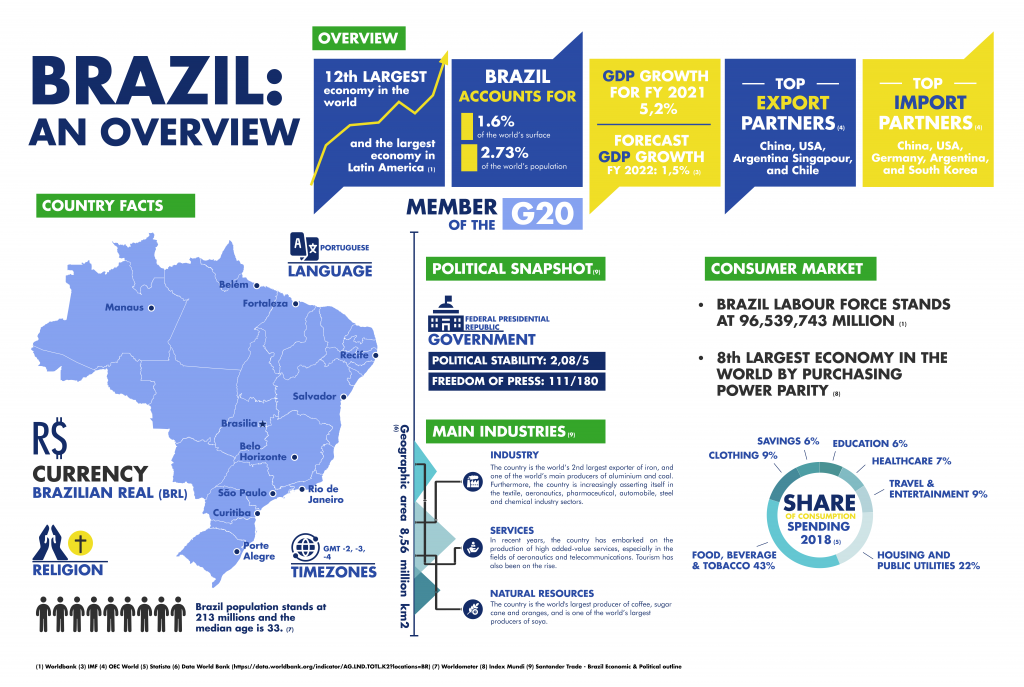Hire Employees in Brazil from Abroad | 2025 Guide
Hiring in Brazil can unlock access to a vast talent pool and one of the most dynamic economies in Latin America. However, navigating the complexities of labor laws, compliance, and cultural differences is crucial. This guide covers all you need to know, from hiring options to compliance, costs, and best practices.
Why Hire in Brazil?
Brazil is a hub of economic opportunity. As the largest economy in Latin America, it boasts a population of over 210 million. Sectors like technology, finance, manufacturing, and agriculture are thriving. Additionally, emerging industries like fintech and renewable energy are rapidly growing.
Hiring in Brazil means access to a diverse, skilled workforce. The country’s unique mix of local expertise and global innovation makes it ideal for businesses expanding internationally. Whether you’re looking for engineers, tech professionals, or manufacturing experts, Brazil has it all.
Exploring Brazil's Workplace Landscape
Brazil at a glance
Brazil, the largest country in South America, combines a vibrant economy, abundant natural resources, and a diverse talent pool. With over 210 million people, Brazil offers significant hiring opportunities across industries like technology, finance, manufacturing, and agriculture. Emerging sectors such as fintech and e-commerce are driving growth, making Brazil a hotspot for international businesses seeking expansion.

Employment Trends and Job Market Analysis
Brazil’s job market has evolved significantly, especially post-pandemic. The growing demand for professionals in technology, finance, and healthcare reflects the country’s economic recovery. Remote work adoption has surged, and hybrid models are now standard in many industries. Businesses in Brazil increasingly prioritize flexibility to attract top talent, creating dynamic opportunities for international employers.
Current Hiring Trends (2025)
In 2025, Brazil’s job market is evolving. Remote and hybrid work dominate hiring trends. Many companies now prioritize flexibility to attract skilled workers. The technology sector leads demand, with roles in software development and cybersecurity topping the list.
Additionally, industries like healthcare, e-commerce, and renewable energy are driving growth. The gig economy is also expanding, especially in tech and creative fields.
Key Talent Hubs in Brazil
Brazil is home to several talent hubs, each with its own strengths:
- São Paulo: Brazil’s financial and business center. Ideal for hiring tech, finance, and multinational professionals.
- Rio de Janeiro: A hub for energy, tourism, and creative industries.
- Belo Horizonte: Known for startups and innovation, especially in tech.
- Curitiba and Porto Alegre: Strong in manufacturing and engineering talent.
How to Hire Employees in Brazil from Abroad: Three Options
Hiring in Brazil involves three main approaches, each tailored to specific business goals:

Engage Contractors
One option is to hire independent contractors. This is a flexible and cost-effective approach, especially for short-term projects or when you don’t need to establish a permanent presence in Brazil. However, it’s crucial to ensure that the contractor relationship is clearly defined to avoid any legal issues related to employee misclassification, which can lead to penalties and back taxes.
Set Up a Local Entity
If you’re planning to have a long-term presence in Brazil, setting up a local entity may be the best option. This allows you to hire employees directly under Brazilian labor laws, ensuring full compliance with regulations. However, this approach involves significant time and costs, including legal registration, tax obligations, and ongoing compliance requirements. It’s suitable for companies looking to establish a significant footprint in Brazil.
Use an Employer of Record (EOR)
For companies that want to hire employees in Brazil without setting up a legal entity, an Employer of Record (EOR) is a practical solution. An EOR acts as the legal employer on behalf of your company, handling payroll, taxes, benefits, and compliance with local labor laws. This option offers flexibility and reduces administrative burdens while ensuring that you remain compliant with Brazilian regulations.
The Cost of Hiring an Employee in Brazil
Employer Contributions in Brazil
Employers in Brazil are responsible for various contributions, which significantly increase the total cost of hiring. Key contributions include:
- INSS (Social Security): Employers must contribute around 20% of the employee’s gross salary to the National Institute of Social Security (INSS).
- FGTS (Fundo de Garantia do Tempo de Serviço): Employers are required to contribute 8% of the employee’s gross salary to the FGTS, a fund that provides financial support in cases of termination.
- Other Contributions: Employers also contribute to the Accident Insurance (RAT), which varies based on the company’s risk classification, and education and training funds.
Learn more about Payroll and taxes in Brazil.
Employee Contributions
Employees in Brazil also contribute to social security and income tax through payroll deductions. The rates for social security contributions range from 7.5% to 14%, depending on the salary level. Additionally, income tax (IRRF) is deducted from employees’ salaries at progressive rates, ranging from 7.5% to 27.5%, based on their income.
Labor Laws and Employee Rights in Brazil
Brazil has a comprehensive labor law system that offers strong protections for employees. Key employee rights include:
- Work Hours: The standard workweek in Brazil is 44 hours, with any additional hours considered overtime, which must be paid at a premium rate.
- Paid Leave: Employees are entitled to 30 days of paid vacation after one year of service, as well as a mandatory vacation bonus equivalent to one-third of their monthly salary.
- Termination Rights: Employees dismissed without just cause are entitled to severance pay, which includes a penalty of 40% on the balance of the FGTS fund.
- Maternity and Paternity Leave: Female employees are entitled to 120 days of paid maternity leave, while male employees are entitled to 5 days of paid paternity leave.

Streamline Your Expansion with EOR Services in LATAM
Expand across Latin America effortlessly with our Employer of Record (EOR) services. We handle compliance, payroll, and employee management, ensuring smooth operations while you focus on growing your business.
Brazilian Labor Laws and Compliance
Key Employee Rights
Brazilian labor laws (CLT) offer strong protections for employees, including:
- Work Hours: A standard 44-hour workweek, with overtime paid at 1.5x the regular rate.
- Paid Leave: 30 days of vacation annually, plus a vacation bonus equivalent to one-third of monthly salary.
- Termination Rights: Employees dismissed without just cause are entitled to severance pay.
- Parental Leave: Maternity leave of 120 days and paternity leave of 5 days, with extensions for some employers.
Best Practices for Attracting Talent in Brazil
To attract top talent in Brazil, it’s important to consider the following best practices:
- Competitive Compensation and Benefits: Offering attractive salary packages, including benefits like health insurance, meal vouchers, and transportation allowances, is essential in Brazil’s competitive job market.
- Flexible Work Arrangements: With the rise of remote work, offering flexibility in work locations and schedules can be a key differentiator.
- Cultural Awareness: Understanding Brazilian work culture and valuing personal relationships can go a long way in building strong employer-employee relationships.
- Compliance with Labor Laws: Ensuring full compliance with Brazilian labor laws not only avoids legal issues but also builds trust with potential employees.
FAQs About Hiring in Brazil
Can I hire employees in Brazil without setting up a local entity?
Yes, using an Employer of Record (EOR) allows you to hire employees without establishing a legal entity.
What are the biggest challenges of hiring in Brazil?
Navigating labor laws, managing payroll compliance, and handling cultural differences can be challenging.
What are the costs of hiring employees in Brazil?
Employers must cover social security, FGTS, and other contributions, significantly increasing the total cost of employment.
Take a look at our cost calculator.
Hire employees in brazil from abroad with Europortage
Hiring employees in Brazil from abroad requires careful planning and a deep understanding of the country’s labor laws, tax obligations, and cultural nuances. By choosing the right hiring approach, whether through engaging contractors, setting up a local entity, or using an Employer of Record (EOR), and by understanding the costs and compliance requirements, you can successfully build and manage a team in Brazil. That’s why we recommend working with a direct and local partner like Europortage.
Our team of local experts is on hand to support you throughout the entire employee lifecycle, including time-off management. We can give you clear advice on business incorporation and global hiring, in addition to handling employment contracts, payroll, and benefits. That way, you can focus on growing a world-class team and business.
Get in touch to find out more and start hiring top talent in Latin America.









